Occupy Central
Occupy Central is a civil disobedience movement which began in Hong Kong on September 28, 2014. It calls on thousands of protesters to block roads and paralyse Hong Kong's financial district if the Beijing and Hong Kong governments do not agree to implement universal suffrage for the chief executive election in 2017 and the Legislative Council elections in 2020 according to "international standards." The movement was initiated by Benny Tai Yiu-ting, an associate professor of law at the University of Hong Kong, in January 2013.
OCCUPY CENTRAL - DAY 33: Full coverage of the day’s events
Occupy Central records must be preserved, archive group argues
Democracy movement is a valuable milestone for HK and the world, archive experts say
PUBLISHED : Thursday, 30 October, 2014, 4:13am
Creativity is in the air at the Occupy protest site in Admiralty. The protests prompted an unprecedented artistic wave. Photo: Sam Tsang
Hongkongers must seize the chance to preserve records of the "umbrella movement" before they vanish, as they hold great importance for not just the city but also people around the world, a concern group says.
Both Occupy Central supporters and detractors had a role to play in starting as soon as possible to keep records of the democracy campaign, as the city had no archive law requiring the government to put the happenings on file for the public, the Archives Action Group said.
The group, which has been pressing for such a law for the last six years, yesterday warned of the urgency of preserving documents from Occupy leaders and their correspondence with the government.
Also relevant were images, messages on posters and even journalists' notes that were not published, the group said.
All these chronicled an important milestone in the history of Hong Kong's road to democracy, it said, but the records could be lost down the road.
"Without an archive law, the government can destroy records," said group member Simon Chu Fook-keung, former director of the Government Records Service.
Chu and his fellow archive-law experts called for the records to be organised systematically, so the files could become a treasure to not only locals but also the world, through recognition from the UN's heritage body.
READ MORE: To view all the latest Occupy Central stories click here
The civil disobedience campaign had made international headlines and taken social movements to a new level, he noted. "The movement has an important impact on the world."
He believed the records would meet the criteria for Unesco's Memory of the World register, an initiative to preserve documentary heritage.
Listed on the Memory of the World register, for example, is a four-day unbroken record of radio broadcasts during the Philippines' people power revolution in 1986.
The Archives Action Group's call comes as many volunteer groups, including cultural workers and lawyers, are already acting to collect and archive materials related to Occupy Central.
Earlier, local museums had refused to help document the now world-famous artworks emerging from Occupy sites.
Group leader William Waung Sik-ying, a retired High Court judge, said they had no plans to approach individual groups archiving Occupy materials, but hoped to host a symposium one day for those involved to discuss suitable ways of handling the information.
They were also willing to offer archive expertise and legal advice to groups volunteering to document the movement, he said.
This article appeared in the South China Morning Post print edition as Call to preserve wealth of Occupy Central records
Occupy threatens city's growth, warn Norman Chan and Joseph Yam
PUBLISHED : Thursday, 30 October, 2014, 4:13am
Joseph Yam urged those supporting the movement to consider what would be in the best interest of younger generations in the long run. Photo: Nora Tam
The head of the Monetary Authority and his predecessor have warned that the Occupy movement is harming Hong Kong's economy and could have a damaging long-term effect on the city's growth.
Joseph Yam Chi-kwong, head of the authority from 1993 to 2009, said the city's prosperity rested on its role as a middleman in the finance industry between the mainland and foreign countries.
"[If] the middleman does not cooperate, is not reliable and is stirring up trouble, the mainland will reduce its reliance [on Hong Kong], reinvent the wheel … and reduce the policy preference towards Hong Kong during the mainland's economic reform," Yam said yesterday.
This would harm the city's job market, currency stability and its healthy fiscal position, he added.
"As it goes on, Hong Kong would not have universal suffrage, no matter if it is a real one, sham one, ideal one, realistic one or pragmatic one," he said.
Yam also urged those supporting the movement to consider what would be in the best interest of younger generations in the long run.
READ MORE: To view all the latest Occupy Central stories click here
Norman Chan Tak-lam, the authority's current chief executive, told Xinhua the Occupy movement would lead to social instability.
He said that at the height of the movement, 44 retail banking branches had to shut down.
"If the current situation continues … it will harm the foundation that keeps Hong Kong's finances stable," he said. "[I] hope the acts that are violating the rule of law will end as soon as possible."
In a Legislative Council meeting, Secretary for Education Eddie Ng Hak-kim said that shops in Mong Kok, Causeway Bay and Tsim Sha Tsui - the main protest areas - reported business was down 80 per cent during the "golden week" national holiday.
More than half the city's bus routes were either suspended or diverted at the peak of the protests and as of Tuesday, 40 per cent of routes were still affected.
Meanwhile, the Alliance for Peace and Democracy said its anti-Occupy petition had collected 1,097,176 signatures by yesterday. Alliance spokesman Robert Chow Yung said the petition proved that Hongkongers were against the Occupy movement and, by extension, public nomination of chief executive candidates.
"Think about it - Occupy Central starts with public nomination, so these million signatures make it clear that people do not support public nomination … A system of public nomination started the Occupy movement, chaos, and disorder," he said.
Meanwhile, from today, Hong Kong Tramways will provide a free shuttle service through Causeway Bay for travellers heading east or west.
This article appeared in the South China Morning Post print edition as Movement 'threatens city's growth'
James Tien's dismissal a sign Beijing doesn't want anyone rocking the boat
James Tien's dismissal from nation's top political advisory body is a clear message to the pro-establishment camp to toe the line on Leung
PUBLISHED : Thursday, 30 October, 2014, 4:13am
The Chinese People's Political Consultative Conference Standing Committee votes to remove James Tien. Photo: CNS
The message behind Beijing's sacking of James Tien Pei-chun as a member of the nation's top political advisory body is loud and clear for pro-establishment figures - toe the line and rally behind Chief Executive Leung Chun-ying or, at the very least, don't rock the boat.
Two political commentators said the unprecedented decision by the Chinese People's Political Consultative Conference (CPPCC) Standing Committee to remove Tien should be understood in the wider context of Beijing's dissatisfaction with the ambiguous position of the city's business heavyweights on the Occupy Central protests.
Tien has a track record of deviating from the stance of the Hong Kong and central governments. His resignation from the Executive Council, days after the huge July 1 protest march in 2003, forced then chief executive Tung Chee-hwa to withdraw controversial national security legislation.
A day after this year's July 1 march, Tien suggested Leung should consider resigning since the number of people who took to the streets was inexplicable given the economy's current strength and the high degree of social stability in Hong Kong.
The organisers estimated 510,000 people took part in the march, while a study commissioned by the South China Morning Post estimated 140,000 people took part.
On Friday, the tycoon-politician urged Leung to consider resigning since he could hardly govern effectively. Tien, who backed former chief secretary Henry Tang Ying-yen in the 2012 chief executive election, is a longtime critic of Leung.
Political commentator Johnny Lau Yui-siu said Beijing had been unhappy with Tien's divergent views and flip-flops in the past decade.
"Beijing's patience with Tien was exhausted, as his call for Leung to consider resigning came at the height of Occupy Central. It's completely intolerable, as Beijing is supporting Leung during the crisis at all costs," Lau said.
The role of the CPPCC - which is made up of delegates from various political parties and organisations as well as experts from different sectors - is similar to that of an upper legislative chamber which does not enjoy real power. Of the 2,237 CPPCC members, 200-plus represent Hong Kong.
READ MORE: To view all the latest Occupy Central stories click here
"Beijing wants to tell other figures from the pro-establishment camp not to follow in Tien's footsteps by punishing him," Lau said. "Don't rock the boat in the time of crisis is Beijing's message for the pro-establishment figures."
Beijing has rejected the possibility of Leung resigning, a core demand of protest leaders.
Xinhua issued an English- language news report at noon on Saturday saying many Hong Kong tycoons, such as Henderson Land Development chairman Lee Shau-kee and Wharf Holdings chairman Peter Woo Kwong-ching, had remained "mute" on Occupy.
It noted that Li Ka-shing, Cheung Kong (Holdings) chairman, had issued a statement on October 15 calling on the Occupy protesters to go home and not to "let today's passion become tomorrow's regrets". "Asia's wealthiest man did not make it clear whether or not he agrees with the appeals of the protesters," the report said.
The Xinhua report said Tung was among the few Hong Kong tycoons to have voiced opposition to the movement.
Contrary to the report, Lee said on September 21 that the mass sit-in would have a very "negative impact on Hong Kong" and damage its reputation as an international financial centre.
On October 11, Woo said the Occupy movement had been successful in showing Hong Kong's freedom of speech to the world. But he said occupying the roads illegally would not be sustainable.
The report was retracted seven hours after it was issued. At 9pm that night Xinhua issued a Chinese-language report saying several Hong Kong business leaders, including Li and others named in the first article, had criticised the Occupy protests.
It issued a similar report in English some 90 minutes later. It is not clear why the first article was taken down.
Lui Che- woo, chairman of the K Wah Group, said in a statement uploaded on his company's website yesterday that he had been opposing any activities which undermine Hong Kong's stability and prosperity.
He said he was heartbroken about the recent turmoil arising from Occupy Central.
Ivan Choy Chi-keung, a political scientist at Chinese University, said Beijing was taking a tough stand on Occupy Central. "Pro-establishment figures will be criticised even if they remain silent on the movement," he said.
This article appeared in the South China Morning Post print edition as Don't rock the boat
PUBLISHED : Thursday, 30 October, 2014, 6:26am
Government urged to keep umbrella movement records
Worth keeping a record.
Archives Action Group has long campaigned for an archives law to enforce good record-keeping and archiving practices in Hong Kong. However, its campaign has fallen on deaf ears within the government despite criticism by the director of audit more than two years ago and the Ombudsman earlier this year.
The criticism from both was damning and you would have thought highly embarrassing for a civil service that takes bureaucratic procedures seriously. The group even presented the government with a draft bill several years ago but to no avail.
The action group has now resorted to trying to increase public awareness of the importance of proper official record keeping in the hope that this will eventually pressure the government into doing something about this long-running scandal. Yesterday, it held a press conference urging the government to preserve its records relating to the umbrella movement.
"This is a historic moment in Hong Kong's history," said William Waung, chairman of the group. "No matter what happens in the future, this is a turning point in Hong Kong." The demonstration has "highlighted some of the key contradictions in Hong Kong society", and it is vital that records relating to these events be properly maintained for future generations.
READ MORE: To view all the latest Occupy Central stories click here
As an example of good record keeping, Waung drew attention to the recentNew York Times story about British efforts to introduce democracy to Hong Kong. The story quoted an editorial in the People's Daily, which said: "In 150 years, the country that now poses as an exemplar of democracy gave our Hong Kong compatriots not one single day of it."
It added: "Only in the 15 years before the 1997 handover did the British colonial government reveal their 'secret' longing to put Hong Kong on the road to democracy."
However, documents recently released by the National Archives in Britain indicate that British colonial governors from the 1950s onwards had tried to introduce popular elections in Hong Kong, but had held off as the Beijing leaders were so opposed to the prospect of a democratic Hong Kong that they threatened to invade the city if these efforts were pursued.
"Without the documents, would anyone accept that story?" Waung asked.
Just over two years ago, the director of audit said in a report that the Government Records Service had failed in just about every aspect of its remit, from looking after records, vetting them and disposing of those no longer required.
Just over a year ago, Chief Secretary Carrie Lam Cheng Yuet-ngor said in a written answer to a Legislative Council question: "Despite there being no dedicated archival legislation, the essential general principles of records management have in fact been implemented in Hong Kong through administration measures."
Despite these assurances, the Ombudsman drew attention to the "constant and enormous backlogs" in the Government Records Service and the obvious shortage of staff. The report noted 11 cases, including the Lamma ferry disaster where a failure to keep proper records led to a government department's poor decision-making or inability to resolve legal issues.
While the government is poor at keeping records, it appears to be relatively efficient in destroying them. In 2011, when government offices moved to Tamar, 2,326 metres of documents were destroyed, the equivalent of 11 times the height of the IFC building. It was highly unlikely that these documents were vetted properly for archiving. In 2013, records continued to be destroyed at a high rate, amounting to 1,400 metres of documents.
Have you got any stories that Lai See should know about? E-mail them to howard.winn@scmp.com
PUBLISHED : Thursday, 30 October, 2014, 3:04pm
UPDATED : Friday, 31 October, 2014, 5:20am
Police inaction or violence cannot be justified, no matter the provocation
Albert Cheng says those who oppose the Occupy movement are wrong to suggest the activists are not entitled to the same protection as other citizens
Police take their position at the Occupy site in Mong Kok. Photo: Reuters
The Centre for Communication and Public Opinion Survey of Chinese University has just confirmed what every citizen should have realised by now: that our society has been polarised by the Occupy movement and the campaign against it.
The centre's latest survey shows that 38 per cent of its 802 Cantonese-speaking respondents supported the Occupy protests, while 36 per cent were against. The younger and more educated tended to be more sympathetic to the Occupy cause and to distrust the police.
The phone interviews were carried out from October 8 to 15, after the police had fired 87 cans of tear gas to disperse the crowds in Admiralty. The centre did a similar poll in mid-September before the confrontation, when 46 per cent said they were opposed to Occupy. Those who were in favour only added up to 31 per cent.
The two sets of results indicate that the wave of so-called blue-ribbon propaganda against Occupy has, by and large, been counterproductive in winning the hearts and minds of citizens.
The televised images of the police under pressure are obviously the most critical factor in the swing of the public mood in about a month. The way the authorities have sought to drum up support for the police might have achieved the opposite effect, by pushing more people to side with the Occupiers.
Last Sunday, Secretary for Food and Health Dr Ko Wing-man became the latest minister to lash out at the Occupiers. His portfolio should have nothing to do with the political issues at hand, but he opted to denounce the activists' attitude towards the police.
He said there was nothing wrong with asking the police to enforce the law strictly. But, he added, "those who have broken the law and yet have asked the police to strictly enforce the law to protect them ought to reflect [on their position]."
Ko's logic is alarming. He is implying that the protesters are not worthy of police protection from being assaulted by thugs in the anti-Occupy camp. Unlike what Ko would like us to believe, the police are duty-bound to ensure anyone's safety, whether or not the person has flouted the law.
Kenneth Ng King-chun, from TVB, employed Ko's line of argument to challenge the secretary general of the Hong Kong Federation of Students, Alex Chow Yong-kang, in a recent interview. He criticised the student leader for double standards. "You want the police to arrest those who attacked the Occupiers. However, you tell the police to stay away and not to clear your blockade. Is this asking the police to be selective in enforcing the law?" he asked.
It is a fact that the Occupy protesters have violated the law. The umbrella movement is indeed premised on civil disobedience. The protesters have opted to pursue democracy by defying the law. Their leaders have time and again pledged to turn themselves in at an appropriate juncture.
Chow was among those arrested on September 27. He was in police custody for two days. He has never asked the police not to arrest him.
Their case cannot be equated with those who sought to provoke and assault the activists. The police are obliged to stop the anti-Occupy gangs from clearing the blockade using violence against the protesters.
In a separate development, it was reported that philanthropist Koo Ming-kown, founder of the Nam Tai group, has refused an honorary doctoral degree awarded last week by Baptist University.
He did so because he opposed the Occupy movement and found the student behaviour despicable. He was particularly upset that former secretary for commerce and economic development Frederick Ma Si-hang was jeered by Lingnan University students at a similar event.
He also said he was sympathetic to the seven "police heroes" allegedly involved in an assault on a protester, claiming they "were provoked and put in a difficult position". Koo, is, of course, entitled to his feelings. However, many find his view despicable.
Justifications of inaction and violence on the part of the police can lead Hong Kong down a slippery slope. It is now more important than ever for the Independent Police Complaints Council to function properly. Unfortunately, two of the most diligent and credible members, Eric Cheung Tat-ming and Christine Fang Meng-sang, are to step down by the end of the year, in accordance with the rules on length of public service.
Two pan-democratic legislators, Kenneth Leung and Helena Wong Pik-wan, will complete their second term of office later this year. Chief Executive Leung Chung-ying is unlikely to reappoint them.
It is a pity that, just two years after Leung has taken the helm, not only is the hard-earned reputation of our police force now at risk, but even the credibility of its supposedly independent watchdog is also in doubt.
Albert Cheng King-hon is a political commentator.taipan@albertcheng.hk
This article appeared in the South China Morning Post print edition as Police inaction or violence cannot be justified, no matter the provocation
Hong Kong needs its leaders to lead, for once, or protests will continue
Anson Chan says now more than ever, Hong Kong needs its government to step up and deliver an electoral reform plan that passes muster with its people and is acceptable to Beijing
PUBLISHED : Thursday, 30 October, 2014, 5:37pm
In the face of the most serious social crisis since the handover, Leung and his top officials are reduced to standing helplessly on the sidelines.
The campuses of Hong Kong's universities are peppered with faculty buildings that bear the names of their generous sponsors, mostly prosperous business tycoons and their heirs and successors. It is sobering to reflect - in the wake of the extraordinary events of the past few weeks - that while huge donations can pay for the bricks and mortar of these splendid edifices, they cannot buy the hearts and minds of the students they were designed to serve.
The street protests of the "umbrella movement" may have been triggered by the August 31 decision of the National People's Congress Standing Committee, but the social pressures that have led to this eruption of anger and defiance of authority have been building for years. The students are fighting for their future, a future they see threatened by a steady erosion of "one country, two systems" and the core values and freedoms it is intended to preserve; a future in which their job prospects are being diminished and their ability to rent or buy a decent roof over their head becoming increasingly remote.
Those of us in the older generation should feel ashamed that the best and brightest of our young people feel so disaffected and marginalised that they have lost all respect for the government and the business elites and vested interests that underpin it. Instead of intoning endlessly about how they are breaking the law, we should be asking ourselves what has driven them to this extreme course of action and what we might have done to prevent it.
One thing of which I am certain: these protests are home-grown. The suggestion that they have been instigated and orchestrated by clandestine and so far unnamed "external forces" would be laughable if it wasn't so insulting to the intelligence and integrity of the demonstrators and so clearly being used to distract attention from genuine grievances. Frankly, only those with their heads totally in the clouds - possibly as a result of spending too much time in their penthouse offices - could be so profoundly out of touch with the feelings of the average man and woman on the street.
The sad fact, as reflected in results of a recent Chinese University public opinion poll, is that Chief Executive Leung Chun-ying's administration has lost all moral authority to govern. Brazen manipulation of the outcome of the public consultation exercise on constitutional reform has been compounded by a complete failure to foresee that dashing people's aspirations for the genuinely democratic election of their next head of government in 2017 would be the straw that breaks the camel's back.
Now, in the face of the most serious social crisis since the handover, Leung and his top officials are reduced to standing helplessly on the sidelines, apparently waiting for instructions from Beijing on what to do next. At this most challenging time, Hong Kong people crave leadership, but it is nowhere to be found. Only the government can break the impasse by setting out the way forward clearly and unequivocally.
First, Chief Secretary Carrie Lam Cheng Yuet-ngor must affirm the government's willingness (hinted at during the televised discussion with the student leaders) to prepare a supplementary report for submission to the NPC, setting out the reasons why there is so much public dissatisfaction with the Standing Committee's decisions. Among other things, it should specifically acknowledge the strong body of public opinion in favour of the complete abolition of functional constituencies by 2020 and the consequent importance of making interim changes to the system of functional constituency elections to the Legislative Council in 2016.
Secondly, she should confirm the intention to create a platform for taking forward further dialogue on constitutional development that includes representation from all sectors of opinion in the community. This dialogue must include arrangements for the 2017 chief executive election. To ensure its impartiality, this platform should be established under the auspices of a university, not the government.
Thirdly, the constitutional development task force must publish, as soon as possible, a menu of the issues that will be open for consideration in the second round of public consultation. Proposals that merely tinker with the composition and voting arrangements for the future nominating committee will not do. Our government must convince the authorities in Beijing that root-and-branch reform is essential, if there is to be any chance of preventing a veto of the whole package by pan-democrat legislators.
Abolition of corporate votes in Legco functional constituencies and the sub-sectors of the nominating committee will be an important element, but not enough in itself. Despite Leung's unbelievably insensitive assertion that the low-income majority in Hong Kong cannot be trusted with participating in the selection of their own head of government, the administration's package must provide for every registered voter to have an equal right to directly elect members to the nominating committee. This is far from perfect, but is manifestly more fair than what is currently envisaged.
Further, if civil nomination is to be ruled out, the threshold for potential candidates to enter the field for consideration by the nominating committee must be low enough to enable a wide range of candidates to present their credentials for nomination and to publicise their manifestos for wide public scrutiny.
Nothing less than these measures will stand any kind of a chance of general acceptance by the community; it may still not be enough to persuade the diehards among the protesters to give back the streets.
One thing is certain: after more than a month, the protesters are not going to pack up and go unless the sacrifices they have made - the sweat, the tears and the indignities they have suffered - yield some real result.
I, like many of my fellow citizens, am hoping and praying for a peaceful resolution of the current situation. The conventional wisdom is that it takes two to tango but, as anyone who enjoys ballroom dancing is well aware, one partner has to lead. That role belongs fairly and squarely to the government; the sooner it recognises this, the better.
Anson Chan, a former chief secretary, is convenor of Hong Kong 2020
This article appeared in the South China Morning Post print edition as Leaders, lead
The role of social media in Occupy protests, on the ground and around the world
PUBLISHED : Thursday, 30 October, 2014, 5:52pm
A screenshot of one of Josie Tao's posts to Instagram.
The message tweeted by Josie Tao Cai-yi immediately after she was tear-gassed and pepper sprayed by riot police in Admiralty on September 28 provided a stark insight into the experience. “First time I’ve actually witnessed the tear gas and pepper spray,” the 27-year-old shared. “Absolutely terrifying.”
 Her message struck a chord that Sunday evening, and thousands of others on Twitter propelled Occupy Central to become a global topic. At the height of the riot police operation, 12 tweets about Hong Kong were being posted every second as images of protesters engulfed in tear gas spread globally. Days before the street protests began, there were just 19 Hong Kong-related messages being posted per minute.
Her message struck a chord that Sunday evening, and thousands of others on Twitter propelled Occupy Central to become a global topic. At the height of the riot police operation, 12 tweets about Hong Kong were being posted every second as images of protesters engulfed in tear gas spread globally. Days before the street protests began, there were just 19 Hong Kong-related messages being posted per minute.
As students invaded the forecourt outside government headquarters – known as Civic Square – on September 26, through the early days of the demonstrations up to September 30, more than 1.3 million messages about the city were posted, the social media company said. During that period the protests were among the most talked about events in the world.
“We’ve seen progressive new ways to connect [on social media], serving the needs of something like this in real time… and making sure we’re always connected, [just so] the message can get out fast.” said Scott Likens, analytics consulting lead at PricewaterhouseCoopers (PwC) China and Hong Kong.
He noted similarities to the organisation of the Arab Spring but the mobilisation of Hong Kong pro-democracy demonstrators “happened very fast” through social media in a way that “I don’t think we’ve really seen in previous events like this”.
On September 28, in the midst of the police action to clear thousands of protesters from the streets outside government headquarters, it was impossible to get reliable news from the ground, Tao said.
“It was quite chaotic on the ground. Accessing information was very difficult because of the scale of what was happening. It was difficult to see what was happening,” she said. “I couldn’t even see any of the red and yellow [warning] flags the police were waving, so I was using social media tools to see what was happening around me, so that I could stay alert,” she added.
On social media, Occupy Central with Love and Peace commands the biggest audience, with nearly 100,000 fans on Facebook and 25,000 followers on Twitter. Similar pages sharing stories inside Occupy camps, such as the Sordicma page jointly-managed by Jessie Pang Yu-tung, are aimed at attracting an anti-Occupy audience in a bid to win them over the cause.
“I hope to prove [anti-Occupy protesters] are wrong, as well as encouraging them to join this movement,” said the 18-year-old, who has participated in the street protests since day one. “I’ve tried to share the news from the street about what is happening because there were many rumours after September 28,” she said.
“The best way to verify gossip is to use social media and get users to right or wrong these rumours.”
One image captured by Tao and posted on photo-sharing platform Instagram showed protesters with their backs turned, hands covering their ears as they scrambled to safety from the plume of tear gas smoke just metres away.
Searching for hashtags such as “Occupy Hong Kong”, “Occupy Central” and “Umbrella Movement” brings up more than 110,000 images.
The volume of photos being shared on Instagram got the Facebook-owned platform banned in mainland China on September 28. Until then it had been one of the few popular websites not already banned on the mainland, where internet access is tightly restricted.
While Facebook and Twitter are among the big players already banned, Chinese alternatives such as Weibo deleted a record 152 posts for every 10,000 – five times higher than normal – as the protests kicked off.
This article appeared in the South China Morning Post print edition as Tear-gassed tweeter began social media explosion heard around the world
http://www.scmp.com/topics/occupy-central
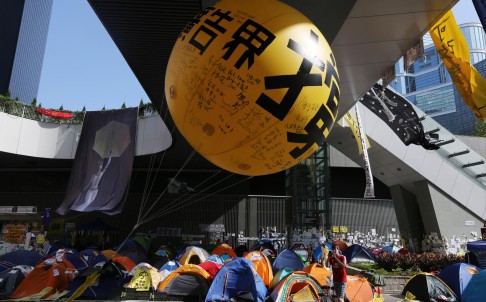
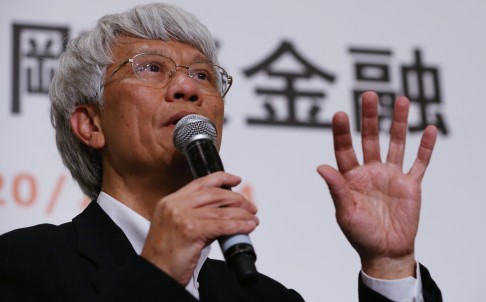
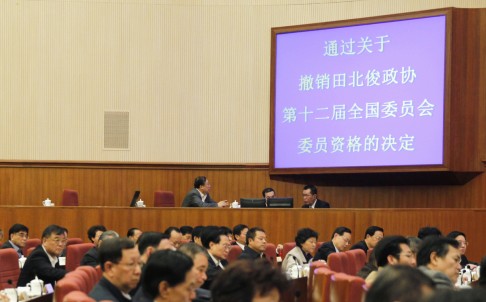


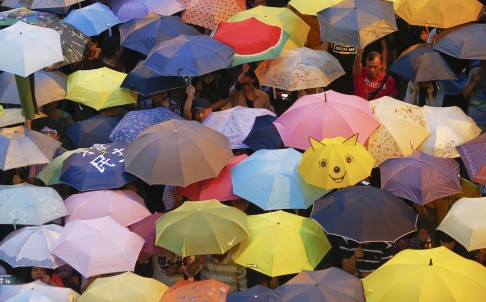

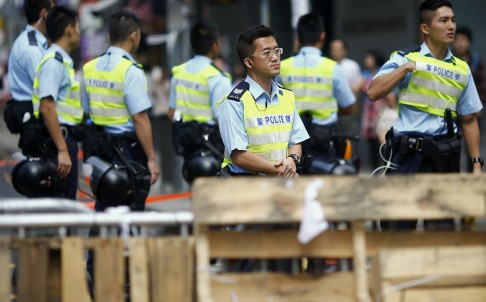
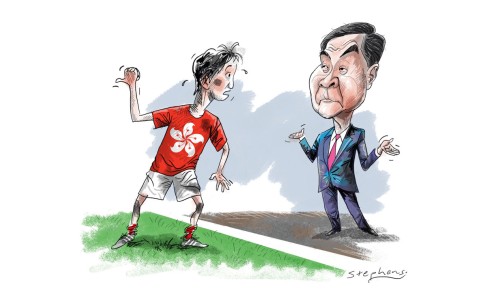

沒有留言:
張貼留言